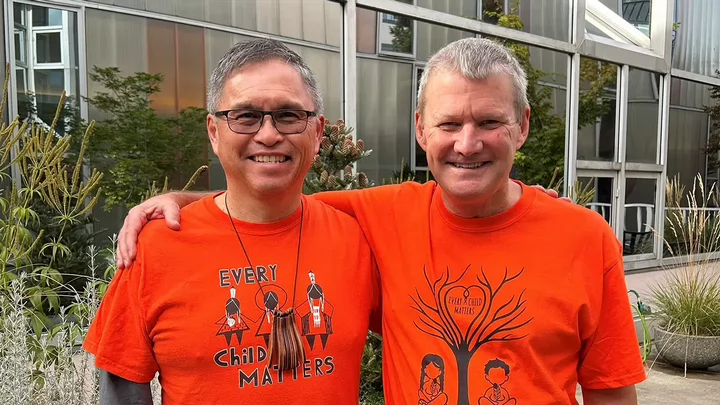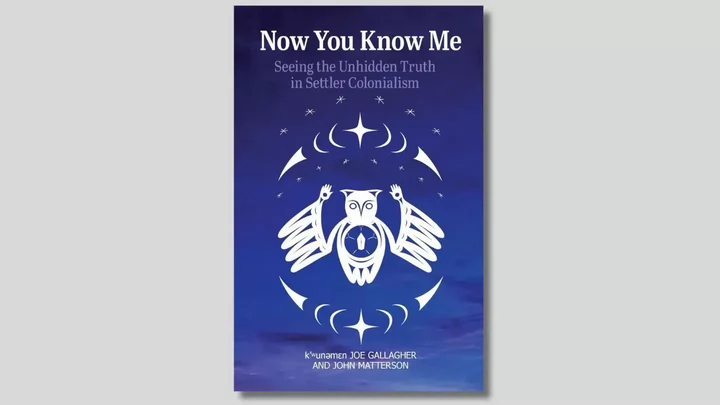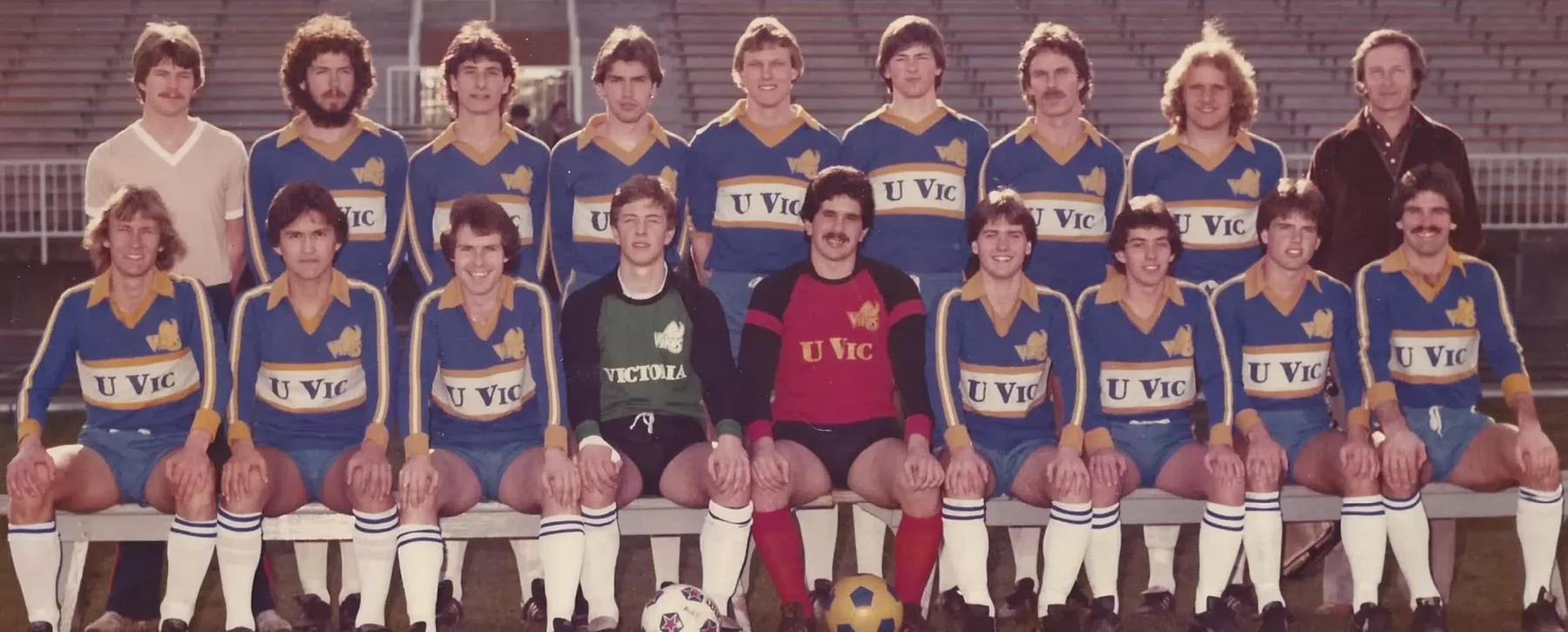Now You Know Me
October 28, 2025

UVic alumnus Joe Gallagher, who is a leader in Indigenous health and wellness, collaborated on a book with his friend John Matterson, a settler, to explore truth and reconciliation together.
A few weeks before COVID-19 stopped the world, k̓ʷunəmɛn Joe Gallagher and John Matterson met in a downtown Vancouver pub for the first time in 35 years.
The two men played on the same soccer team when they were 13 years old. They went to high school together and hung out from time to time. When they enrolled at the University of Victoria as undergrads, they became roommates for a year.
Gallagher is Coast Salish from the Tla’amin First Nation, where he was raised on BC's Sunshine Coast, just north of Powell River. Matterson is a white settler who grew up in Powell River on traditional Tla’amin territory. Although they are from the same small town, they grew up in different worlds.
Not long after the two men reconnected, in 2019, Matterson proudly watched Gallagher cross the stage at UVic, wearing a traditional Tla’amin cedar hat, to receive an honorary doctorate of laws. Gallagher was recognized for the work he had done in advancing the title and rights of his own Tla’amin Nation and the leadership he provided in establishing the First Nations Health Governance partnership between BC First Nations and the federal and provincial governments. Matterson, who had been diagnosed with Parkinson’s in 2015, reflected on the impact of his own work after a long career in finance and technology.
“I realized I had put a lot of effort into making a lot of rich people richer,” writes Matterson. “Joe was making a difference in improving people’s health and wellness, and I wanted to be part of something like that.”
Friends who became co-authors
That brief reunion in Vancouver evolved into long Zoom calls over the pandemic. Gallagher had started researching his family history, and the two men decided to lean into the issues they were discussing and write a book together. “It became a way we could reframe our friendship by getting to know each other on a different set of terms,” Gallagher says.

The resulting book, Now You Know Me: Seeing the Unhidden Truth in Settler Colonialism, is a powerful testament to friendship and what truth and reconciliation really means. Told in alternating voices, the book follows Matterson’s journey as he comes to better understand his friend and the impact of colonialism on Gallagher’s life. Despite the racism and trauma Gallagher faced growing up, Matterson learns how his friend drew on Coast Salish culture and knowledge to become a leader in First Nations health and wellness.
Finding an identity
Soccer plays an influential and joyful role in Now You Know Me. For Gallagher, soccer is more than a game. It gave Gallagher a way to develop a Tla’amin identity and to learn traditional teachings that he has applied to his life beyond sports. Although Gallagher’s parents both fluently spoke the Tla'amin Nation's language ʔayʔajuθəm (pronounced eye-uh-joo-thum), the impact of residential schools and the racism his community faced meant much of Tla'amin culture was not passed onto Gallagher and his siblings.
Through soccer, Gallagher was inspired by many great Tla’amin soccer role models and learned Tla'amin teachings, including to honour those who came before you, being your best and showing humility. He learned words from his language, which players used on the field. Tla'amin teams were fast-paced, skilled and played the sport with flair. “Sports brought out the warriors within our people, who picked up the sport and performed at an extremely high standard,” he writes.
The summer before he came to UVic, Gallagher trained hard. He initially made UVic’s Junior Varsity Norseman and became a starter on the varsity team early in the season, going on to earn most improved player two seasons in a row.
Journey to graduation
Playing varsity sports gave Gallagher a sense of belonging and privilege at a time when few supports were available at UVic for Indigenous students—and he was able to finish his degree in leisure studies. “It was a hell of a journey to get me to graduate,” Gallagher says. “I probably wouldn’t have made it if I didn’t have a soccer identity.”
While UVic soccer helped boost his confidence, it was the “Native ball” tournaments that Gallagher loved most. “I cared more about those tournaments than I cared about UVic,” recalls Gallagher. “The style was so different and free-flowing and provided a rare space where I could be proud of who I was and where I am from.”
Soccer helped him survive and then thrive as a young Tla’amin man—and he went on to play on several highly competitive teams in the international arena.
Indigenous knowledge valued
After UVic, the friends took different paths. Matterson, who studied business at UVic for a year before moving to Vancouver, became a Certified General Accountant. He eventually became an executive in the BC forest industry and later in international tech companies, living and working in Michigan, California and Singapore.
Gallagher graduated with a Bachelor of Arts from UVic in 1987, and he returned to his community. On and off the pitch, Gallagher was a trailblazer. After working with youth in the Downtown Eastside of Vancouver and later at the Victoria Native Friendship Centre, Gallagher moved onto leadership roles in governmental and First Nations organizations.
He worked in health care, community development, economic development and intergovernmental affairs. Gallagher served as director of programs at Health Canada’s First Nations and Inuit Health Branch, BC Region. He became chief negotiator in the early 2000s for his own nation’s treaty negotiations through the Sliammon Treaty Society.
From 2006 to 2019, Gallagher served in executive leadership roles in health, including leading the First Nations Health Authority, the first and only health authority of its kind in Canada, supporting the health and wellness of more than 200 First Nations.
When Gallagher’s niece, Makara, died of Sudden Infant Death Syndrome (SIDS) in 2012, Gallagher advocated for culturally appropriate care. This led to systemic changes for how the BC Coroners Service handles the death of infants.
Throughout it all, Gallagher has kept Indigenous knowledge about health and wellness top of mind. Health refers to being free from sickness or injury, Gallagher says, whereas wellness means being in a state of good health. “We have many First Nations teachings that contribute to achieving and living our best lives—to achieve the right balance of health and wellness,” he says.
Gallagher is vice-president of Indigenous Health and Cultural Safety at the Provincial Health Services Authority in BC and operates Qoqoq Consulting Ltd. There is a long way to go in addressing systemic racism and achieving equitable healthcare for Indigenous people. Gallagher says we all have a role to play in fulfilling the Truth and Reconciliation Commission’s Calls to Action and recommendations from the 2020 report, In Plain Sight: Addressing Indigenous-specific Racism and Discrimination in BC Health Care.
Building bridges
They grew up in different worlds, but these two friends have built a bridge—and provided a blueprint for others. Matterson hopes other settlers can start their own journeys. “This story of two communities happens all over Canada,” Matterson says. “How do we change people who grew up like me?”
As Matterson reckons with the true history of Canada throughout the book, he confronts the privileges he enjoys as a white settler and challenges the deeply ingrained stereotypes and biases he had toward Indigenous people. Now You Know Me offers an example of how settlers can move from a place of ignorance to allyship with Indigenous people.
For Gallagher, writing the book gave him an opportunity to reflect on his family and community’s history, and his long career in Indigenous health and wellness. At the end of Now You Know Me, Gallagher quotes the Coast Salish Knowledge Keeper Sulksun, who says we are all medicine. We get to choose, Sulksun says, whether we are good medicine or bad medicine for one another.
—Stephanie Harrington, MFA ’17
Alumni Guest Speaker Series event
Hosted by Dr. Tammy Hopper, Dean of the Faculty of Health, this event brought together UVic distinguished alumnus k'ʷunəmɛn Joe Gallagher and John Matterson for a conversation about their powerful new book, Now You Know Me: Seeing the Unhidden Truth in Settler Colonialism.
This article appears in the UVic Torch alumni magazine.
For more Torch stories, go to the UVic Torch alumni magazine page.

